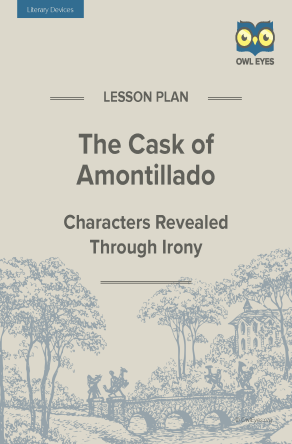The Cask of Amontillado Literary Devices Lesson Plan
- 16 pages
- Subject: Character Analysis, Irony, Literary Devices, Lesson Plans and Educational Resources
- Common Core Standards: RL.9-10.1, RL.9-10.3, RL.9-10.4, RL.9-10.5
- Grade Levels: 9, 10, 11, 12
Product Description
Characters Revealed Through Irony
This lesson plan focuses on Poe’s use of irony in developing the main characters in the story, Montresor and Fortunato. Students will identify different types of irony throughout the narrative, examine how they relate to character development, and analyze what they reveal about Montresor and Fortunato. In studying the irony in “The Cask of Amontillado,” students will be better able to describe Montresor and Fortunato’s relationship and to explain what drives their behavior in the story.
Skills: close reading, identifying and interpreting irony, drawing inferences from the text
Learning Objectives: By the end of this lesson, students will be able to
- identify and describe examples of verbal irony, situational irony, and dramatic irony in the text.
- analyze and explain how Montresor’s and Fortunato’s character traits are revealed through irony.
- describe the relationship between Montresor and Fortunato
About This Document
Owl Eyes lesson plans have been developed to meet the demanding needs of today’s educational environment and bridge the gap between online learning and in-class instruction. The main components of each plan include the following:
- An introduction to the text
- A step-by-step guide to lesson procedure
- Previous and following lesson synopses for preparation and extension ideas
- A collection of handouts and worksheets complete with answer keys
Each of these comprehensive, 60-minute plans focus on promoting meaningful interaction, analytical skills, and student-centered activities, drawing from the Common Core Standards for English Language Arts and the expertise of classroom teachers.
Introduction to the Lesson
A classic tale of deception and revenge, “The Cask of Amontillado” concerns a diabolical murder in the catacombs beneath an Italian palazzo. With the dramatic first sentence, readers enter the disturbed mind of Montresor, the main character who narrates the story. In recounting the events, Montresor reveals the depth of his depravity in avenging a personal insult. The object of Montresor’s intense hatred and obsession with revenge is Fortunato, a wealthy wine merchant whose transgressions against Montresor are never specifically identified. Fortunato’s arrogance and foolish nature make it possible for Montresor to succeed in carrying out a carefully crafted scheme—to murder Fortunato by burying him alive in the catacombs.
As Montresor relates how he planned and executed his revenge, his descriptions and interpretations of what occurred are infused with irony, the predominant literary technique employed by Poe in the narrative. Dramatic irony is created as readers are drawn into Montresor’s mind to view events from his perspective as well as their own. Also evident in the story are situational and verbal irony. Through the irony that permeates “The Cask of Amontillado,” the characters of Montresor and Fortunato are revealed indirectly and the horror of Montresor’s revenge is intensified. Poe’s use of irony also underscores the mood of the story in its examination of human nature and the darkness to be found in the human psyche.
Worksheet Excerpt: What Is Revealed About Montresor and Fortunato?
Recalling the examples of dramatic, verbal, and situational irony in the story, consider how they reveal specific character traits in Montresor and Fortunato. Keep these questions in mind as you analyze their characters. After examining their characters, list several of their character traits that are implied through the irony in the story and be prepared to explain your thinking.
I. Dramatic Irony
- What is revealed about Montresor as readers enter his mind and then watch as he goes about murdering Fortunato?
- What is revealed about Fortunato during his conversations with Montresor?
II. Verbal Irony
- What is revealed about Montresor as he continues to mock Fortunato by saying one thing while meaning another?
- How does Montresor seem to feel while mocking Fortunato? Why?







